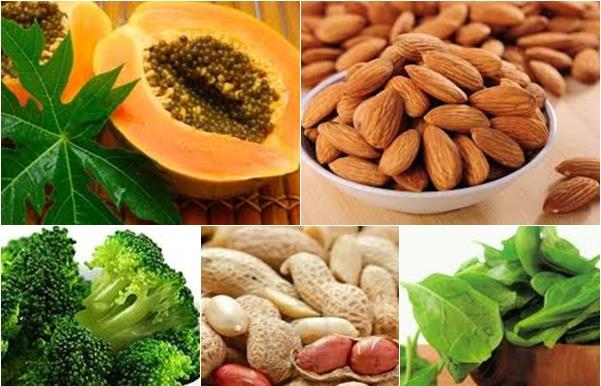Vitamin E is an important nutrient that helps blood vessels dilate enough for free blood circulation while boosting the immune system. Through diet, mothers can fully supplement this nutrient for children but need to calculate a reasonable way
1 / The importance of vitamin E to the health and development of the baby
Vitamin E plays a very important role in the child's body. Vitamin E participates in the metabolism of cells, reducing oxidation of fat-soluble proteins thereby helping your child prevent atherosclerosis. This micronutrient also helps to protect body cells from damage, thereby helping to strengthen the immune system and help the body fight off germs. The antioxidant power of vitamin E also reduces the risk of cataracts and other diseases that can cause vision impairment.

How is vitamin supplement for children? Through food, most children will get all the nutrients their bodies need. However, babies born prematurely or with health problems may be advised to get a daily supplement of vitamins and minerals. These are essential factors for the body to build strong bones and teeth, and prevent anemia.
2 / How much vitamin E does the child need?
1-3 years: 6 mg, or 9 IU (international units) vitamin E daily.
Ages 4-8 years: 7 mg daily, or 10.5 IU daily.
Many children do not get enough vitamin E from the diet, but also do not have a serious vitamin E deficiency and cause health problems. In the United States, the majority of adults and children consume vitamin E slightly below the recommended level. Your baby doesn't have to get enough vitamin E every day. Instead, moms should calculate the average vitamin E intake over a few days or a week.
3 / Food sources of vitamin E for children
Here are some of the best food sources of vitamin E:

Vitamin E can be found in a variety of foods including fruits, vegetables, nuts, and seeds.
- 28g dried almonds: 7mg
1 teaspoon of wheat germ oil: 6mg
- 28g dry roasted sunflower seeds: 6mg
- 1 tablespoon almond butter: 4mg
1 tablespoon sunflower seed butter: 4mg
- 1 tablespoon smooth peanut butter: 2mg
- 28g dry roasted peanuts: 2mg
- 1 teaspoon sunflower oil: 1.8mg
- 1 teaspoon safflower oil: 1.5mg
- ½ medium kiwifruit (peeled): 1mg
1 teaspoon of corn oil: 0.6mg
- ¼ cup frozen cooked spinach: 0.8mg
¼ cup frozen broccoli: 0.6mg
- 1 teaspoon soybean oil: 0.4mg
- ¼ cup of mango: 0.9mg
Note: Dried nuts pose a choking hazard to children. Therefore, you should crush or chopped. Likewise, you should also spread a thin layer of butter from the nuts before feeding them. Children may eat more or less of the above amount depending on their age and taste. So you can estimate the appropriate nutritional content for your child.

Why need to provide enough potassium for children? Potassium is an important nutrient for maintaining the body's fluid balance as well as maintaining optimal blood pressure and helping muscles to contract, but currently, babies are only getting 60% less Potassium recommended. So how can mother overcome this situation?














